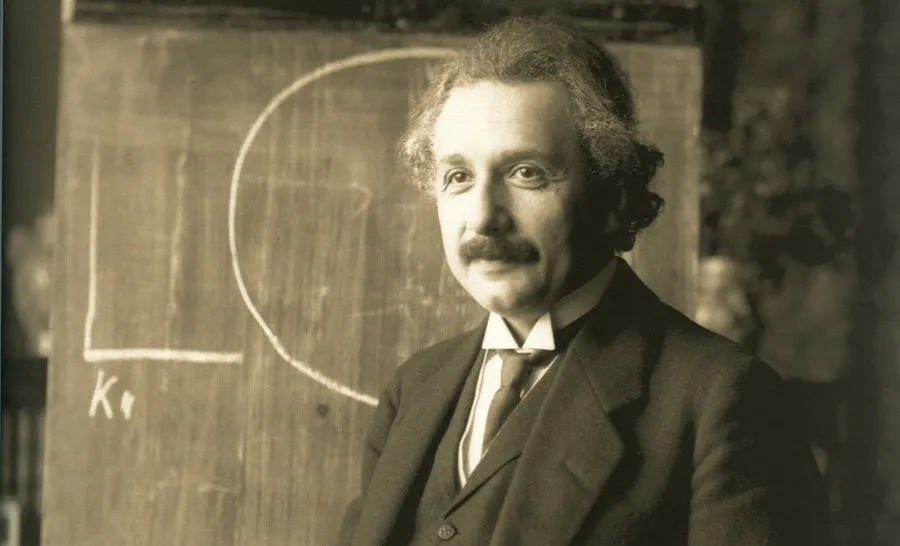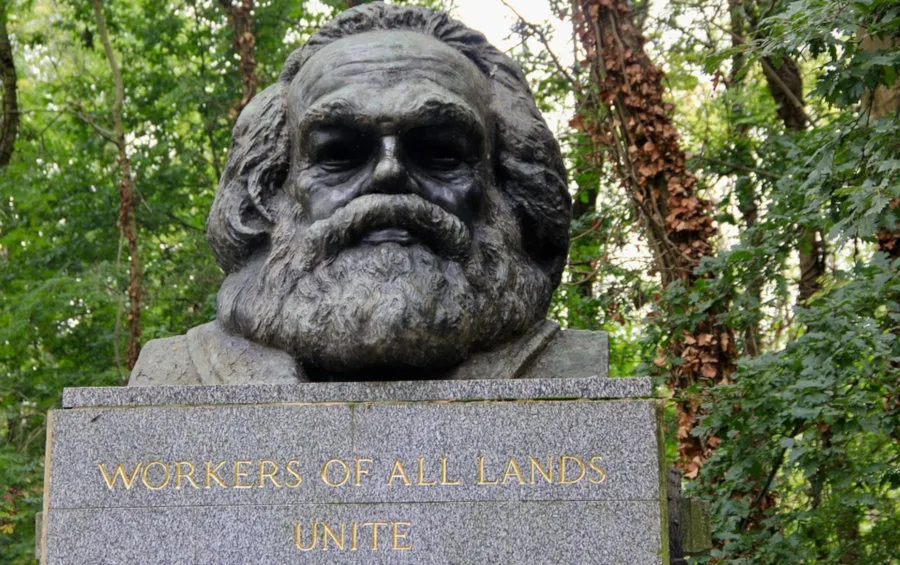Albert Einstein was a brilliant scientist, I think we can all agree to that. But what many people don't know is that his brilliance wasn't confined to the field of science or physics alone; he had a lot to say about a lot of other things, and unlike, let's say, Jordan Peterson, what he had to say outside his field of expertise makes a lot of sense, even today.

source: Wikipedia
I love Einstein, or at least what he has done for all of us. It takes a brilliant mind and some serious out-of-the-box mental gymnastics to come up with the crazy idea of uniting space and time, and to assert that space and time warp and bend relative to the observer's speed. What relatively view people know however, is that this brilliant mind also spoke on a lot of other subjects, like religion, society and the economy.
I'd like to share with you the essay he wrote for the May 1949 issue of the Monthly Review magazine; this insightful text is almost prophetic as it describes perfectly the state of human cultural evolution of today, or at least in my humble opinion it does. The title is "Why Socialism?", and it tries to explain the developments in western society as seen by Einstein in those years after the second World War. Einstein identifies the relationship between the individual and society as "the essence of the crisis of our time", something I myself have expressed in so many posts on this blog.
Proponents of capitalism, especially the fanatic and fundamentalist ones such as anarcho-capitalists, objectivists and capitalist libertarians, accept as truth that all human progress has come about through our remarkable capacity to exchange ideas, plan ahead and work together in an organized manner. Collective efforts lay at the root of all we've accomplished, they know that. Yet they stubbornly hang on to an ideology that ascribes every accomplishment (and every failure) to mere individuals. Great men have shaped history and are responsible for all major human accomplishments; in their world-view, Einstein is one of those Great Men, yet the man himself will be the first to acknowledge that his great scientific accomplishments owe a lot to the society that made possible those accomplishments. Einstein, like all of us, stood on the shoulders, the accomplishments of countless men and women in his own time and before.
What follows are excerpts from this essay, just to convey the essence of Einstein's message. At the end I'll link the full audio-book as well as the PDF file; the video is 21 minutes, so it's a 20 minute read. But here are the key excerpts, describing the idea he tries to convey. Einstein, like Newton, Da Vinci and Nikola Tesla, is seen as one of the rare singularly brilliant minds, and if he says that socialism is infinitely preferable over capitalism, who am I to disagree? ;-)

source: Max Pixel
Man is, at one and the same time, a solitary being and a social being. As a solitary being, he attempts to protect his own existence and that of those who are closest to him, to satisfy his personal desires, and to develop his innate abilities. As a social being, he seeks to gain the recognition and affection of his fellow human beings, to share in their pleasures, to comfort them in their sorrows, and to improve their conditions of life.
The individual is able to think, feel, strive, and work by himself; but he depends so much upon society -in his physical, intellectual, and emotional existence- that it is impossible to think of him, or to understand him, outside the framework of society. It is "society" which provides man with food, clothing, a home, the tools of work, language, the forms of thought,and most of the content of thought; his life is made possible through the labor and the accomplishments of the many millions past and present who are all hidden behind the small word "society."
I have now reached the point where I may indicate briefly what to me constitutes the essence of the crisis of our time. It concerns the relationship of the individual to society. The individual has become more conscious than ever of his dependence upon society. But he does not experience this dependence as a positive asset, as an organic tie, as a protective force, but rather as a threat to his natural rights, or even to his economic existence. Moreover, his position in society is such that the egotistical drives of his make-up are constantly being accentuated, while his social drives, which are by nature weaker, progressively deteriorate. All human beings, whatever their position in society, are suffering from this process of deterioration. Unknowingly prisoners of their own egotism, they feel insecure, lonely, and deprived of the naive, simple, and unsophisticated enjoyment of life. Man can find meaning in life, short and perilous as it is, only through devoting himself to society.
The economic anarchy of capitalist society as it exists today is, in my opinion, the real source of the evil. We see before us a huge community of producers the members of which are unceasingly striving to deprive each other of the fruits of their collective labor -not by force, but on the whole in faithful compliance with legally established rules. In this respect, it is important to realize that the means of production -that is to say, the entire productive capacity that is needed for producing consumer goods as well as additional capital goods- may legally be, and for the most part are, the private property of individuals.
Private capital tends to become concentrated in few hands, partly because of competition among the capitalists, and partly because technological development and the increasing division of labor encourage the formation of larger units of production at the expense of smaller ones. The result of these developments is an oligarchy of private capital the enormous power of which cannot be effectively checked even by a democratically organized political society. This is true since the members of legislative bodies are selected by political parties, largely financed or otherwise influenced by private capitalists who, for all practical purposes, separate the electorate from the legislature. The consequence is that the representatives of the people do not in fact sufficiently protect the interests of the underprivileged sections of the population. Moreover, under existing conditions, private capitalists inevitably control, directly or indirectly, the main sources of information (press, radio, education). It is thus extremely difficult, and indeed in most cases quite impossible, for the individual citizen to come to objective conclusions and to make intelligent use of his political rights.
These are, in my opinion, brilliant observations for a man who lived in a time of hope and rebuilding after the greatest war the world had ever seen. A time when capitalism still seemed to work for most people in the developed world. If he would be alive today, he would cringe at the sight of the media monopolies and the attacks on freedom of speech by the governments of "free democratic western societies", which he would correctly identify as plutocracies. What he predicted in that last excerpt has come true today; so many citizens indeed seem unable "to come to objective conclusions and to make intelligent use of [their] political rights". Everyone who votes for conservatives votes even more against their own personal interests then those who vote for liberals. Still half the country does so. But then again, the liberals have forsaken any true progressive economics, which is to say anti-capitalist economics. Social democracy is about the most progressive we can hope for almost everywhere in the world in 2022. That needs to change.
I left out the large introduction, among other things, in which he talks about human evolution, both biological as well as cultural, and identifies correctly that we can not change our biology, but can and do change our culture. He talks about us now being in a stage of "the predatory phase" of human development, and that socialism is one possible way to rise above that level. I suggest you read it in full, all 5 pages, which you can download here: Why Socialism?. Or listen to the 21 minute audiobook on YouTube:
"Why Socialism?" Albert Einstein Full Audio Book
Thanks so much for visiting my blog and reading my posts dear reader, I appreciate that a lot :-) If you like my content, please consider leaving a comment, upvote or resteem. I'll be back here tomorrow and sincerely hope you'll join me. Until then, stay safe, stay healthy!

Recent articles you might be interested in:
| Latest article >>>>>>>>>>> | Silurian Hypothesis |
|---|---|
| Econ 101: Control | Gospel Of Wealth |
| Alternative Reality | Crisis Of Masculinity? |
| Mainstream Lamestream | White Lives Matter |

Thanks for stopping by and reading. If you really liked this content, if you disagree (or if you do agree), please leave a comment. Of course, upvotes, follows, resteems are all greatly appreciated, but nothing brings me and you more growth than sharing our ideas.